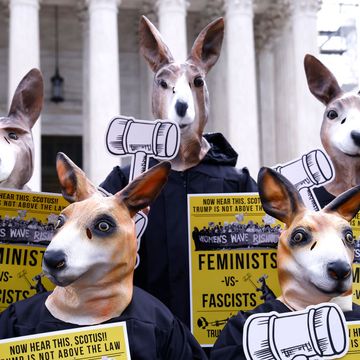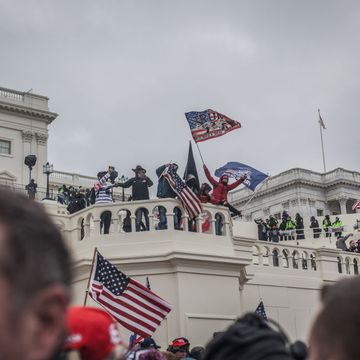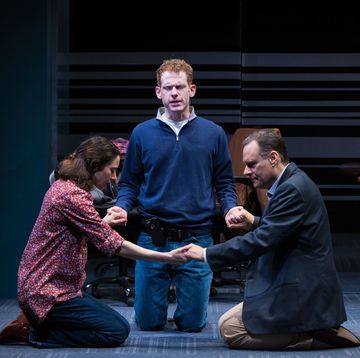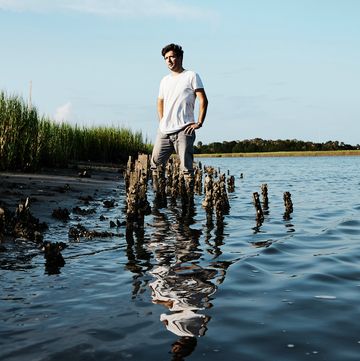[Photo: At the Jenner manse in Hidden Hills, California, as Kylie, left, and Kendall are being shot for the new season of Keeping Up With the Kardashians.]
Published in the June/July 2012 issue
Fathers suffer a curse, and Bruce Jenner knows this curse better than most: The day you become a father, you stop being who you were. In the eyes of your children, your life began when theirs did.
The strange thing about Jenner, now that he's sixty-two years old: It's not just his glorious past that has disappeared. It's as though all of him, every previous incarnation of him, has been flooded out of view: by the fame of his adopted family — his third wife, the former-and-sometimes-still Kris Kardashian, her son, Rob, and her collection of daughters, Kourtney, Kim, Khloé, Kendall, and Kylie, the last two also Jenner's — by the glib demands of reality-TV story lines, by dubious plastic surgery and eyebrows plucked to oblivion. Even in his own home, that familiar Spanish castle with the fountain splashing out front, you have to look hard to find those few traces of his existence. ("My mom's house," Kim calls it.) All of the photographs are of the children; all of the memorabilia and props are the product of their successes, not his. There is no red singlet in a frame; his gold medal is nowhere to be found. For the most part, Bruce Jenner, Olympian, has been banished to the garage.
Right now, that's where he is, cleaning some stray grass clippings off his Goblin 700, a fluorescent-green remote-control helicopter. He owns many remote-control helicopters, and they are on rows of shelves in a corner of the garage. Some of his other toys surround him: a Harley-Davidson, a Porsche kept under a black cover, his golf clubs, which he tries to swing every day. (Even here, however, he can't escape the influence of the hurricane women in his life, a pink Vespa scooter leaning nearby.) But it's the helicopters that receive the bulk of his attention. He has just been out flying the Goblin 700 in his pristine backyard, for the benefit of the ever-present camera crew that films Keeping Up With the Kardashians, which began its seventh season in May. (He's also dressed up for the occasion, sporting a flashy leather jacket.) They watched him fly the helicopter, and sixteen-year-old Kendall and fourteen-year-old Kylie did, too, for a few minutes — the episode currently being shot centers on them — until the sun grew too hot and they vanished back inside. Then the camera crew left as well. But there was Jenner, still in his backyard, flying his Goblin 700. And with it, he was doing magic tricks.
Flying these helicopters is not easy. "If you own one, you've crashed it," Jenner says with a smile, because he is almost always smiling. They're especially difficult because they require the operator to think from an unnatural perspective. Jenner has a flight simulator in his garage, a black computer perched on another shelf, and since he began flying these helicopters three years ago, he has spent hundreds of hours alone out here, on that simulator, training himself to see the world in all of its dimensions. Although he has been a real pilot for a very long time (and is a principal at Bruce Jenner Aviation, which sells corporate aircraft), he still had to adapt his brain to the peculiar demands of the Goblin 700. Depending on whether he has the helicopter's tail facing toward him or away from him, on whether he's flying the helicopter right side up or inverted, all the rules of flight change. Even something as simple as a gentle hover takes a delicate, practiced touch. Jenner still possesses an instinctive physical confidence, still moves with an athlete's grace. And there he was, just a few minutes ago, his helicopter fluorescent green against the bright blue sky, defying gravity and physics with every spin, stall, and roll. In that moment, Jenner was a man of nearly perfect competence.
Neither his children nor the cameras were there to see it. They were gathered in the driveway, toward the front of the house. They are still there. Either Kendall or Kylie, it's hard to tell which, is having some sort of animated disagreement with Kris. The cameras are there, in the girls' made-up faces, and a boom mic is raised over their shining heads, recording every word of their spirited discussion, to be edited into a cohesive narrative about the perils of being a teenage girl in modern celebrity America.
Jenner, meanwhile, has finished his unrecorded acrobatics and returned to his unlit garage. He picks the last blade of grass from the body of his helicopter, and he folds its propeller so that both rotors point toward the tail, and he gently slides a protective sleeve over them, and he puts his Goblin 700 back into place on the shelf, each step as meticulous and careful as the last. He stops for a moment to marvel at the tricks that more talented others can do with the same machine. "It's amazing to me that someone can even think that fast," he says. Then, because he knows the cameras are no doubt done with him for the day, he heads inside to take off his leather jacket and change out of his fancy clothes.
In the driveway, voices are rising.
This is who Bruce Jenner was: "I was a dyslexic kid," he says, now in his nylon pants and gray USA Track & Field T-shirt, sitting back by the pool, the cameras still occupied with his wife and daughters. He failed second grade in Yorktown Heights, New York, and was plagued by low self-esteem: "I always thought everybody else was better than me." Then in the fifth grade he had a race at school, and he won. Jenner was the fastest, and he held on to that feeling for dear life. Sports became his outlet, and because he was blessed before he was cursed, he was good at everything he tried. He was born limitless. Eventually, he found his way to the decathlon, a grueling series of ten track-and-field disciplines, including sprint and distance running, hurdles, discus, javelin, and pole vaulting. The decathlon was and remains the best measure of the greatest athlete on earth.
In 1972, Jenner went to Eugene, Oregon, to compete for a spot on the U. S. Olympic team. He was a long shot: Only the top three competitors made the team, and Jenner was not ranked even in the top ten. After the first five events, he was rooted firmly in eleventh place. After the sixth event, the 110-meter hurdles, he was still in eleventh. After the discus, he edged up to tenth, with just three events to go. After the pole vault, he jumped from tenth to seventh, and after the javelin, he climbed from seventh to fifth. (He recites each of these details from memory, forty years after the fact.) Then Jenner did the math: Given the decathlon's complicated system of points, in the last event, the fifteen hundred meters, he had to beat the man then occupying third place by eighteen seconds. Jenner ran, shaving eight seconds off his personal best time and eclipsing the formerly third-place competitor by twenty-one seconds. He had made the team and was off to Munich.
There, he finished tenth, well short of the podium. But Jenner watched the winner receive his gold medal, and he made up his mind.
A photographer had taken a black-and-white picture of Jenner crossing the final finish line in Munich: hair flowing, muscles rippling. Jenner had that photograph blown up, and he put it up on the wall in his austere apartment, over his couch. Except that he didn't center it. He pushed it off to the left, because he was saving a spot for the next photograph, the one that would be taken when he crossed the finish line in triumph in Montreal in 1976. He trained for eight hours a day, every day, for four years, and every night, Jenner came home and looked at that empty space on his wall. "I stared at that hole," he says, "and knew what was going to go there."
It takes an extraordinary man to bend such a grand reality to his will. "My greatest gift in life was being dyslexic," Jenner says. "It made me special. It made me different. If I had not been dyslexic, I wouldn't have needed sports. I would have been like every other kid. Instead, I found my one thing, and I was never going to let go of it. That little dyslexic kid is always in the back of your head."
There is a video of Jenner's Montreal triumph. Jim McKay narrates it. The video opens with film of Jenner running the final turn of the final event of the first day, the four hundred meters. He is wearing blue shorts and a red singlet, number 935. McKay's unmistakable voice begins: Strong though he is, just as lean and hard and well trained as he could possibly be, still, this is the face of a tired, breathless man, reaching for reserves not used until now. And that's the purpose of the decathlon: to test the total man, body and spirit, to the last ounce of energy. The video then freezes on Jenner's agonized face: his eyes blackened, his teeth biting into his bottom lip. It looks a lot like the photograph that was taken when he finally won the gold the following afternoon, shattering the world record, only in that photograph — in color this time, the photograph that Sports Illustrated put on its cover — his mouth is open, because he is screaming in victory. "I was as close to perfection as I could possibly get," he says today. "I got everything out of myself." Bruce Jenner was, indisputably, the greatest athlete on the planet. He was possibly the greatest in its history.
"It's about working when nobody's watching," he says.
Not long after he says that, some speakers fire up out by the pool. The theme song from Keeping Up With the Kardashians — finger snaps and that infuriatingly catchy whistle — rings out across the sparkling water.
"That's our doorbell," Jenner says, looking down at his chest. He looks up and starts to laugh, first a little, and soon a lot.
"It wasn't my idea!" he says, wiping his eyes. "It's not me! It's my wife!"
Kris Kardashian Jenner is striking, her huge, dark eyes are striking — looking at her, you can see exactly where Kim comes from — but they rarely settle on any one place for long. Her hectic days are scheduled to the minute. She sits behind the glass desk in her home office ("Well, it's technically hers," Jenner says, even though there isn't a single indication that it might ever be his), surrounded by countless photographs of her famous children and towering piles of mail, juggling her phone, tapping away at her computer. The family's publicist and "brand manager," Noelle Keshishian — yes — appears in Kris's door, just in case there is a short pause that might be more productively filled. "What makes me excited," Kris says, "you have to stop and think about ... [She checks her e-mail.] Wait, who wants to get on the phone at two? [She looks at Noelle.] We should get on the phone with Kecia, too... . You have to stop ... [She goes back to her e-mail.] Pearl wants to get on the phone... . [She looks back at Noelle.] Can you tell her yes? At 1:45? All right, cool. You have to stop and think ..."
She never does finish the thought. Kris is the center of this operation, and it is an operation. Somewhere there must be a map with plastic artillery on it. "Being a celebrity is a business," Bruce Jenner says. "That's how you have to look at this, and by that measure, this is a very successful business." Today, Kim is on the covers of four of the five biggest gossip magazines; tomorrow, there will be panting speculation about her supposed hookup with Kanye West, because she will be seen wearing the same leather pants on consecutive days; a few days later, it will be Khloé's turn, after her husband, basketball star Lamar Odom, will be put on the inactive list by the Dallas Mavericks. "You see them everywhere, all the time," Jenner says. "There's a reason for that."
Jenner knows fame. Olympic fame, in particular, is intense but almost always temporary. Jenner had dedicated his life to this one thing, and he had done it, and now it was over. "My best friend, gone," he says. It was the most final of breakups. He never did put up that photograph in the empty space on his apartment wall. He never ran competitively again; he even left his vaulting poles at Olympic Stadium. (He still doesn't know their whereabouts. The last he heard, they had been shipped to a young athlete in San Jose, circa 1977.) He enjoyed some lucrative endorsements, appearing on the Wheaties box; General Mills recently reissued it, just ahead of the 2012 Summer Games. "I guess I haven't done anything too wrong," Jenner says, smiling some more. He gave acting a try, but that was an honest mistake. (His single theatrical release, a Village People/Steve Guttenberg vehicle called Can't Stop the Music, will haunt him more than any single frame of Keeping Up With the Kardashians ever could: supershort jorts.)
He also got married, twice, and divorced, twice. Each marriage produced two children: Burt and Cassandra, and then Brandon and Brody, those princes of Malibu. His children lived with their mothers, and he didn't see them often, because everything in his life had gone ugly. Khloé, the Kardashian daughter to whom he is perhaps the closest, phrases it gently but clearly: "He maybe wasn't able to give his children what they needed."
Then in 1990, he met Kris. She was newly separated from her husband, Robert Kardashian, a lawyer who later became famous for his role as one of O. J. Simpson's defenders. Jenner and Kris didn't have much in common, except that they independently liked to give their same-sex offspring names that started with the first letter of their own name. Seven months later, they were married, and they had two more children, two more daughters with names beginning with K.
"We're exact opposites," Kris says, "in that he's more stern and serious, he's kind of the voice of reason, and I am ..." And here she really does stop and think. "You've got to remember that this is my second life," she finally continues. "I was a housewife and a mother; that was my priority for the first half of my life. Now, after my first litter grew up, I had two more kids with Bruce, and he wanted to be really involved, and I went to work. He made that decision, because with his first kids, he maybe wasn't the best father. With us, he got a second chance."
On the show, Jenner can seem emasculated, as though his testicles are in a jar somewhere, along with the rest of his former presence, this once-proud man drowning in a sea of estrogen and petty humiliations. He can seem that way because that's essentially what he is. Bruce Jenner has suffered the curse of fathers everywhere, but he has suffered it more dramatically and more publicly than perhaps any other American dad. There are entire generations who have no idea that he did what he did, that this man once flew through the air on the end of a fiberglass pole, that he was once just as lean and hard and well trained as he could possibly be. They don't know that because his framed singlet is in storage somewhere, it turns out, and his gold medal is locked away in a safe. He's asked whether he might retrieve it. He just shakes his head.
Instead, he's been doing quiet, invisible things, like mastering the always-changing rules of flight or playing golf or driving his kids to school — or at least that was something he also once did until Kendall recently turned sixteen. "He's heartbroken that he can't drive the car pool anymore," Kourtney says. "He really looked forward to that."
But if there is a moral center in this crazy house, he is still that. "He's just such a good person with such a good heart," Khloé says. "He's such a strong man," Kim says. They all talk about him with surprising warmth; the Kardashian girls were young when he married their mother. Kourtney, the eldest, was twelve, and she resented her new stepfather at first. "But he didn't give up on me," she says. "He never gave up."
What those people who hate this family from afar can't see is the very particular love that stamps it. Bruce Jenner has taken it upon himself to rescue his ridiculous extended clan by doing what none of its other members will ever do: He has elected to lose. The person in the house who has most earned his fame has chosen to accept the least of it. "I'm done with competition," he says. He says that in response to a question about his helicopters, whether he might fly them in the professional events that have been cropping up around the country, but he means it about everything. Jenner has made decisions, now, here, during his own second life. He has made up his mind once again. His singlet is in storage because he wants it to be. He's the one who locked his medal away in the safe.
"Going through what I went through," he says, "being that obsessed, is not what I would consider a good, well-rounded life. You're selfish with your time. You're selfish with your thoughts. You don't have to grow up. All you're concerned with is scoring points."
Jenner has learned that perfection comes in many forms. He has learned that a private mastery is just as satisfying as a public one. He has learned that a curse isn't a curse if it's a choice. And he has learned that there may be no greater love a father can give his children than to accept that his life really didn't begin until theirs did.
On that photograph on his apartment wall — the first one, the black-and-white one, the losing one — Jenner had printed a quote. He had found it in a book by Roger Bannister, the first man to break the four-minute mile. That feat was considered impossible: If a man ran that fast, for that long, his heart might explode.
Today, Jenner closes his eyes and recites the quote that he read every night, all those years ago. He doesn't get the words exactly right, but he gets them mostly right. In the book, this is how they read: Only in something like running can finality be achieved, the sort of finality that is almost perfection. But it is not the kind of perfection that leaves you with nothing to live for. You are not your own executioner, because sport is not the main aim in life. Yet to achieve perfection in one thing, however small, makes it possible to face uncertainty in the more difficult problems in life.
"I love that," Jenner says, his eyes opening again. The part he left out was the part about not being his own executioner.














